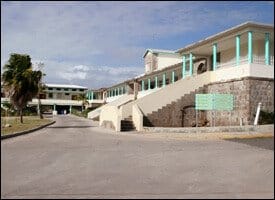
The Alexandra Hospital On Nevis
Charlestown, Nevis
August 10, 2009
The Nevis Ministry of Health on Friday issued additional guidelines to safe guard the Nevis public against the H1N1 Influenza (Swine Flu).
It advised that any person with flu like symptoms which included a high fever, cough, runny nose, sore throat, muscular aches and pains, diarrhea and vomiting must stay home and call their nearest health centre or private physician for advice.
Persons with flulike symptoms who experience difficulty breathing, dehydration or weakness must seek medical attention immediately at the hospital. In such a case, the Ministry of health said in a release that a family member or friend should call ahead to alert the hospital emergency room of the patient’s arrival.
“To prevent the spread of the virus cover your nose and mouth when you cough or sneeze.
“To keep your body’s immune system strong, eat well balanced, nutritious meals, keep well hydrated, get sufficient rest, relaxation and exercise, practice proper personal hygiene, avoid stressful situations, do not smoke and do not drink excessive amounts of alcohol,†the release further stated.
The Ministry also advised that persons on medication for chronic diseases such as diabetes are asked to take their medication as prescribed.
In the press release, Medical Officer of Health on Nevis Dr. Judy Nisbett gave the assurance that there was an adequate supply of antiviral medication available on the island, for persons who needed it, as determined by a medical doctor.
The release also reminded that the possibility existed of severe illness in some groups of persons who had underling conditions.
The group included persons with Asthma and other lung conditions, Obesity, Diabetes and other metabolic conditions, weakened immune systems due to conditions such as HIV, Sickle Cell Anaemia, Cancer, Kidney Disease and Liver Disease, Pregnancy, children under five years old and the elderly over 65 years of age.
However, the release added, it did not mean that persons who had the underlying conditions mentioned would automatically get severe disease.
The HINI 2009 Influenza virus gained pandemic status by the World Health Organization (WHO) earlier this year, following widespread human infection. To date, all continents have been affected by the virus. Nevis recorded its first confirmed case of the illness last week.